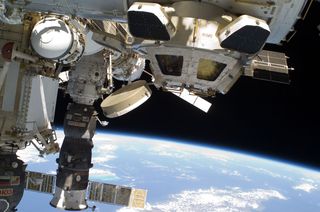Shuttle Discovery to Leave Space Station for Last Time Today

HOUSTON – NASA's space shuttle Discovery is poised to cast off from the International Space Station for the last time today (March 7), nearly 12 years after the prolific spacecraft's first visit to the orbiting lab.
Discovery and its six astronauts will undock from the space station at 7 a.m. EST (1200 GMT), to end an 8-day visit that delivered a new storage module, extra supplies, and a humanoid robot assistant to the orbiting laboratory.
The mission is Discovery's final flight before it is retired later this year along with the rest of NASA's shuttle fleet. Discovery is NASA's most-traveled space shuttle, and is the oldest in service today.
After undocking, shuttle pilot Eric Boe will fly Discovery on a victory lap around the station, known as a fly-around, before the orbiter officially departs. [Photos from Discovery's Final Mission]
"It's a privilege to do the undock and fly-around," Boe said in a news briefing that was held Friday (March 4). "What's amazing is how big the structure is. Majority of the U.S. segment was brought up piece by piece by the space shuttle, which is truly amazing."
The fly-around is used to inspect the exterior of the station, but it also allows Discovery's astronauts to snap photographs of the completed structure with all the other visiting vehicles: the Japanese HTV-2 cargo ship, the European Space Agency's ATV-2 cargo craft, the Russian Progress cargo ship, and two Russian Soyuz spacecraft.
After leaving the space station, the astronauts will use the shuttle's robotic arm to conduct a final inspection of the spaceship's heat shield. The crew will relay data to ground teams here at NASA's Johnson Space Center, to ensure that the shuttle's thermal protection system is in good working order for the orbiter's upcoming re-entry into Earth's atmosphere.
Get the Space.com Newsletter
Breaking space news, the latest updates on rocket launches, skywatching events and more!
Discovery will then spend two days in orbit before landing at NASA's Kennedy Space Center in Florida on Wednesday, March 9.
Discovery's 13-day STS-133 mission is the shuttle's final flight before it is retired from service. The workhorse orbiter has now made a total of 39 trips into space, including 13 visits to the International Space Station. Discovery was also the very first shuttle to dock to the International Space Station during its STS-96 mission, which blasted off from NASA's Florida spaceport on May 27, 1999.
Discovery Discovery launched on its final flight on Feb. 24, and arrived at the space station two days later. NASA decided to extend the original mission by two days, giving the shuttle a total of 13 days on orbit. The flight's primary goal is to help outfit the station for the years ahead, when NASA will no longer have the enormous cargo-carrying capability of the space shuttles.
NASA is bringing its 30-year space shuttle program to an end later this year, and following the STS-133 mission, Discovery will be grounded for good after 27 years of spaceflying. [Gallery: Building Space Shuttle Discovery]
NASA has two final space shuttle missions planned – the STS-134 flight of Endeavour in April, and the final STS-135 flight of Atlantis in June.
You can follow SPACE.com Staff Writer Denise Chow on Twitter @denisechow as she covers Discovery's final space voyage from NASA's Johnson Space Center in Houston. Visit SPACE.com for complete coverage of Discovery's final mission STS-133.
Join our Space Forums to keep talking space on the latest missions, night sky and more! And if you have a news tip, correction or comment, let us know at: community@space.com.

Denise Chow is a former Space.com staff writer who then worked as assistant managing editor at Live Science before moving to NBC News as a science reporter, where she focuses on general science and climate change. She spent two years with Space.com, writing about rocket launches and covering NASA's final three space shuttle missions, before joining the Live Science team in 2013. A Canadian transplant, Denise has a bachelor's degree from the University of Toronto, and a master's degree in journalism from New York University. At NBC News, Denise covers general science and climate change.
Most Popular


